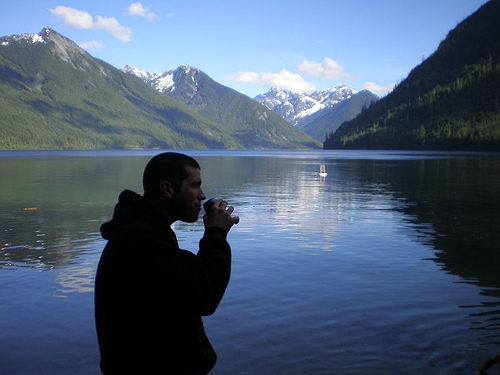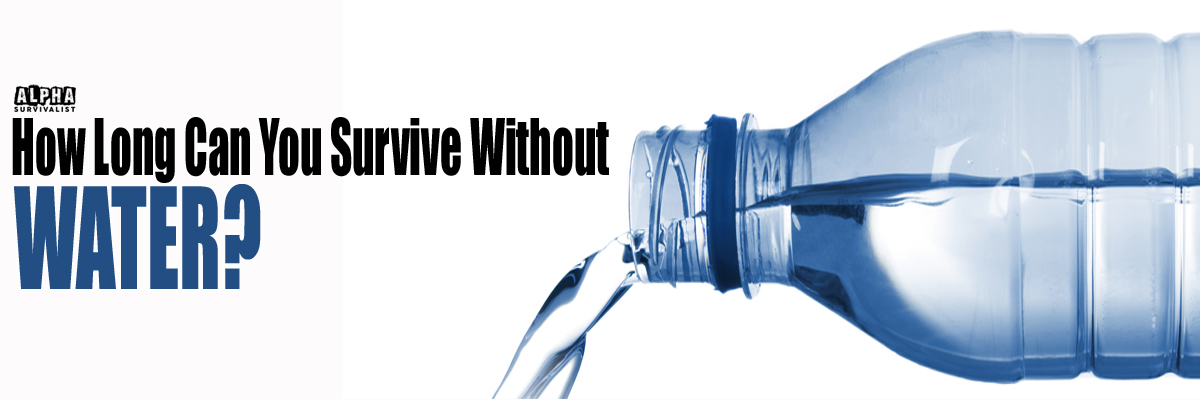Updated February 2021 – How Long Can You Survive Without Water? Water is vitally important for your survival, and therefore your body’s water balance must always be maintained.
Your body will lose water through sweating and urinating but also when you breathe as your breath is heavily saturated with water. This is no more noticeable than on cold days when the moisture in your breathe condenses instantly in the cold air upon exhaling.

If you are unable to replace lost fluids your body will not function properly. It will eventually shut down. How long your body can last without water will depend on the climatic conditions and your physical activity.
The average person can live for three days without water, but there are always exceptions to this rule. Individuals have been known to last longer as well as shorter periods of time without water.
Needless to say, in an emergency situation, spending time finding drinking water is way more important than finding food. An average person is able to last for around three weeks without eating, although it would be pretty uncomfortable to do so.
There have been people that have been able to survive 8 to 10 days without a drop of water but that is highly unusual. It is very unlikely for the average person to be able to live for this long without water. In fact, in order to last as long as that the conditions must be absolutely perfect.
The Effects of Climate on Dehydration
If for whatever reason you found yourself lost in the wilderness, for example, there is only a limited period of time that you will be able to survive without water.
Basically, the hotter and drier the climate and the more activity you do in those sapping conditions, the shorter your life expectancy. In the most extreme cases, life expectancy can be reduced to just a few hours.
If you are in an extremely hot environment, such as a desert, your body temperature will increase. This results in increased levels of sweating as your body attempts to cool down. You can lose as much as 1.5 liters of water an hour through sweating.
This amount of water loss cannot go unchecked. If it is not replaced it will lead to decreased blood flow around your body because water is responsible for the viscosity of your blood. This reduced blood flow will put you at risk of experiencing serious health problems and ultimately death. Unfortunately, this can happen all too quickly.
Other Factors
Children are at an even greater risk of dehydration as they have a much lower water volume to skin surface ratio than adults. This means children will therefore get into trouble much quicker.
Sickness and diarrhea, often caused by drinking contaminated water, can also lead to rapid dehydration. This is regardless of the climatic conditions. So it is imperative to maintain fluid intake even if you may not want to.
Fluid intake does not necessarily mean drinking just water; you can also take on fluids by drinking fruit juice among other things. Whatever you do though, do not drink alcohol as it will cause you to dehydrate quicker.
You can avoid sickness by ensuring you purify water before drinking by boiling or adding chemicals. Even using a survival straw will ensure that 99.99% of all bacteria and parasites would be filtered out of your drinking water which is enough to keep you healthy and hydrated in an emergency.
How Long Can You Survive Without Water: The Facts
- Around 65 percent of your body is made up of water.
- An average person will only survive for three days without water
- Water is the main constituent of blood and is vital in supplying nutrients to your cells. Blood starved of water does not flow!
- Water also helps your body to remove toxins and other impurities, toxins that would quickly poison you if they were allowed to build up.
- Water is needed to provide cushioning to your joints and soft tissue around your body.
- Without water, your body is unable to absorb the nutrients in food or even digest it properly.
- If you do not have access to water there is a good chance you will not have access to food either. This will further weaken your body.
- Children dehydrate faster than adults
- Vomiting and diarrhea will cause rapid dehydration
- Alcohol may quench your thirst but will dehydrate you quicker.

